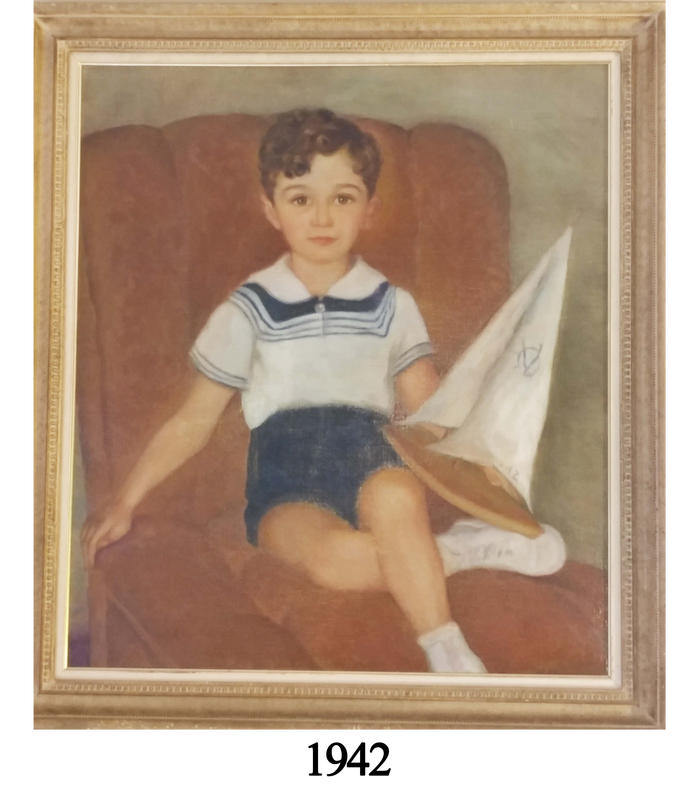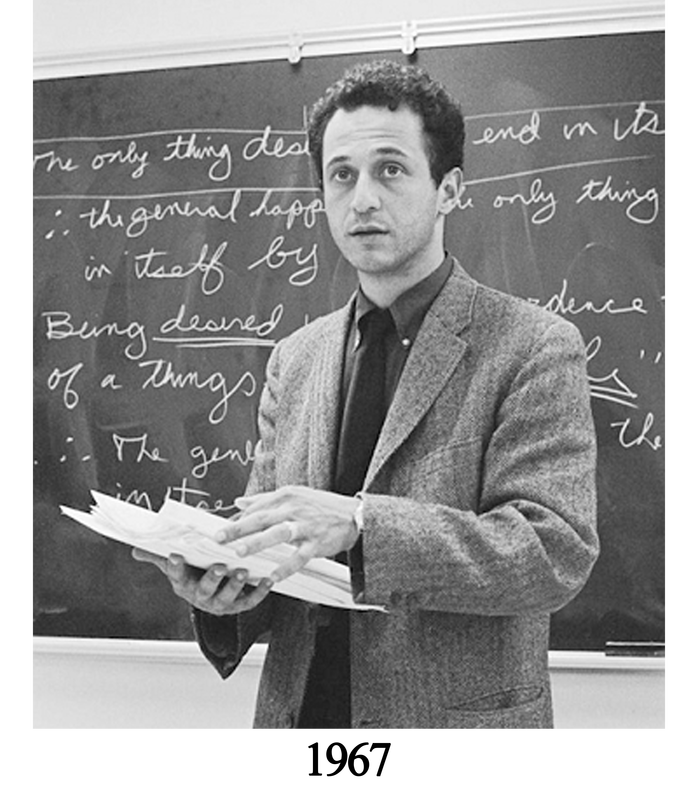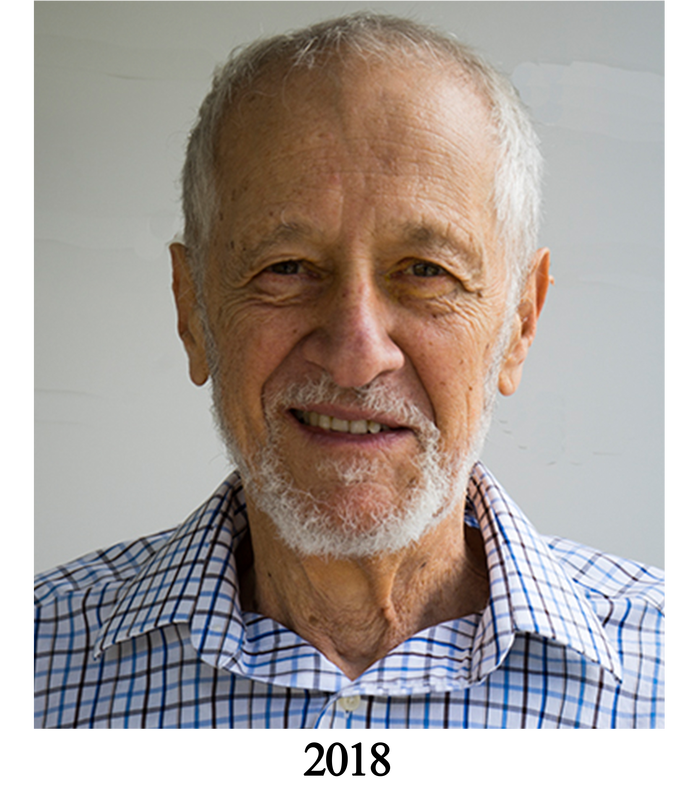Abbreviated c.v.
Born: August 28, 1937
Educational background:
B.A. Philosophy (with honors, Phi Beta Kappa) Northwestern University, 1959)
Ph. D, Philosophy, University of California at Berkeley, 1966
Professional and teaching career:
Assistant Professor, University of California at Santa Cruz, 1965 – 1968
Assistant Professor, University of Illinois at Chicago, 1968 -1973
Associate Professor, University of Illinois at Chicago, 1973 – 1978
Carolyn and Fred McManis Professor of Philosophy (endowed chair),
Southwestern University, 1978 – 1987
Professor and Chair, Department of Philosophy, Georgia State University, 1987 – 1995
Associate Dean for the Humanities and various other administration positions, 1995 – 2006.
Fellowships:
National Endowment for the Humanities Junior Fellowship, 1969
National Endowment for the Humanities Senior Fellowship, 1977
American Council for Learned Societies Fellowship, 1984
Main philosophical interests: history of modern philosophy, the philosophy of Leibniz
Other scholarly interests: ethics, free will problem, metaphysics
Publications:
Leibniz: Metaphysics and Philosophy of Science, ed by R. S. Woolhouse, Oxford University Press, 1981, pp. 77 - 89.
Essays on Early Modern Philosophers: From Descartes and Hobbes to Newton and Leibniz, edited by V. Chappell, Garland Publishing, Volume 12, on Leibniz.
Leibniz: Critical Assessments, edited by R. S. Woolhouse, Routledge and Kegan Paul, 1993.
10 . “About Moral Beliefs,” Philosophical Studies, vol. 24, 1973 pp. 31 - 37.
11.“Leibniz’s Proof of the Uniqueness of God,” Studia Leibnitiana, Band VI, Heft 2, 1974, pp. 262 - 271.
12. "Is the Best Possible World Possible?” The Philosophical Review, vol. LXXXIV, no. 2, April 1975, pp. 163 - 177.
13. Review of C. D. Broad’s Leibniz, Noûs, vol. X, no. 3, Sept. 1976, pp. 339 - 344.
14. “Can I Know that I Am Not Dreaming?” (with Jean Beer Blumenfeld) in Descartes: Critical and Interpretive Essays, edited by Michael Hooker, The Johns Hopkins University Press, 1978, pp. 234 - 255.
15. “On the Compossibility of the Divine Attributes,” Philosophical Studies, vol. 34, no. 1, July 1978, pp. 90 - 103. Anthologized in: The Concept of God, edited by Thomas V. Morris, Oxford University Press, 1987, pp. 201 - 215.
16. “Superessentialism, Counterparts, and Freedom,” in Leibniz: Critical and Interpretive Essays,” edited by Michael Hooker, University of Minnesota Press, 1982, pp. 103 - 123.
17. “Leibniz on Contingency and Infinite Analysis,” Philosophy and Phenomenological Research, vol. XLV, no. 4, June 1985, pp. 483 - 514.
18. Review of The Philosophy of Leibniz: Metaphysics and Language by Benson Mates, Journal of the History of Philosophy, vol. XXVI, no. 3, July 1988, pp. 485 - 488.
19. “Freedom and Mind Control,” The American Philosophical Quarterly, vol. 25, no. 3, July 1988, pp. 215 - 227.
20. “Freedom, Contingency, and things Possible in Themselves,” Philosophy and Phenomenological Research, vol. XLIX, no. 1, September 1988, pp. 81 - 104.
Anthologized in:
Essays on early modern Philosophers: From Descartes and Hobbes to Newton and Leibniz, edited by Vere Chappell, Garland Publishing, 1991/92, vol. 12 on Leibniz.
Leibniz: Critical Assessments, edited by R. S. Woolhouse, Routledge and Kegan Paul, 1993.
21. Review of Leibniz’s Metaphysics by Catherine Wilson, The Journal of the History of Philosophy, vol. XXX, no. 2, April 1992, pp. 303 - 306.
22. Two entries in A Companion to Epistemology, edited by Jonathan Dancy and Ernest Sosa, Blackwell’s, October 1992: a. “Truths of Reason/Truths of Fact” b. Necessary/ Contingent.”
23. Critical Study: Leibniz & Arnauld: A Commentary on Their Correspondence by Robert Sleigh Jr., Yale University Press, Philosophy and Phenomenological Research, vol. LIII, no. 4, December 1993, pp. 933 - 943.
24. Proceedings from the Georgia State University Conference on Human Freedom, edited by David Blumenfeld, special issue of Social Theory and Practice, vol.16, no. 3, Fall 1990. 25. “Perfection and Happiness in the Best Possible World,” in The Cambridge Companion to Leibniz, edited by Nicholas Jolley, Cambridge University Press, 1995, pp. 382 - 410.
26. “Leibniz’s Ontological and Cosmological Arguments,” in The Cambridge Companion to Leibniz, edited by Nicholas Jolley, Cambridge University Press, 1995, pp. 353 - 381.
27. Overcoming Racism and Sexism, edited by Linda Bell and David Blumenfeld, Roman & Littlefield, 1995.
28. “Sexism and Male Gender Identity: A Reply to Thomas, in Overcoming Racism and Sexism, edited by Linda Bell and David Blumenfeld, Roman & Littlefield, 1995, pp. 173 - 178.
29. “Rationalism,” Philosophy of Education: An Encyclopedia, edited by J. J. Chambliss, Garland Publishing Company, 1996. Pp. 524 - 528.
30. “Politics,” Power, and Ebonics,” Joan Carson and David Blumenfeld, Atlanta Journal/Atlanta Constitution, January 13, 1997, A9.
31. “Here’s a Good Volley for Ebonics Debate,” Joan Carson and David Blumenfeld, Atlanta Journal/Atlanta Constitution, March 2, 1997, L10. 32. 32. “Integrating Accountability Systems and Reward Structures: Workload Policy, Post-tenure Evaluations, and Salary Compensation,” A. Abdelal, D. Blumenfeld, P. Dressel, and T. Crimmins, Metropolitan Universities, vol. 7, no. 4, spring 1997, pp. 61 - 73.
33. Review of Leibniz’ Universal Jurisprudence: Justice as the charity of the Wise by Patrick Riley, Harvard University Press, 1996, Philosophical Books, vol. 39. No. 3, July 1998, pp. 167 - 169.
34. “Living Life Over Again,” Philosophy and Phenomenological Research, vol. LXXIX, no. 2, September 2009, pp. 357 - 386.
Select philosophical publications: See Articles. Literary publications are listed under Stories and Poems
Born: August 28, 1937
Educational background:
B.A. Philosophy (with honors, Phi Beta Kappa) Northwestern University, 1959)
Ph. D, Philosophy, University of California at Berkeley, 1966
Professional and teaching career:
Assistant Professor, University of California at Santa Cruz, 1965 – 1968
Assistant Professor, University of Illinois at Chicago, 1968 -1973
Associate Professor, University of Illinois at Chicago, 1973 – 1978
Carolyn and Fred McManis Professor of Philosophy (endowed chair),
Southwestern University, 1978 – 1987
Professor and Chair, Department of Philosophy, Georgia State University, 1987 – 1995
Associate Dean for the Humanities and various other administration positions, 1995 – 2006.
Fellowships:
National Endowment for the Humanities Junior Fellowship, 1969
National Endowment for the Humanities Senior Fellowship, 1977
American Council for Learned Societies Fellowship, 1984
Main philosophical interests: history of modern philosophy, the philosophy of Leibniz
Other scholarly interests: ethics, free will problem, metaphysics
Publications:
- “On Not Seeing Double,” Philosophical Quarterly, April 1959, pp. 264 - 266.
- “Necessity, Contingency, and Punishment,” (with Gerald Dworkin), Mind, July 1966, pp. 396 - 404.
- “Punishment for Intentions,” (with Gerald Dworkin) Mind, July 1966, pp. 396 - 404.
- “Guilt and the Aims of Psychoanalysis,” (abstract) The Journal of Philosophy, Oct. 1966, pp. 587 - 588 (listed on front of the journal as “Freedom and Guilt”).
- “Lehrer’s Proof of the Consistency Thesis,” Philosophical Studies, Jan. - Feb. 1971, pp 26 - 30.
- “The Principle of Alternate Possibilities,” The Journal of Philosophy, June 1971, pp. 338 - 445.
- “Free Action and Unconscious Motivation,” The Monist, July 1972, pp. 4, pp. 132 -140.
- “Leibniz’s Modal Proof of the Possibility of God,” Studia Leibnitiana, Band IV, Heft 2, 1972, pp. 132 - 140.
- “Leibniz’s Theory of the Striving Possibles,” Studia Leibnitiana, Band V, Heft 2, 1973, pp. 163 - 177.
Leibniz: Metaphysics and Philosophy of Science, ed by R. S. Woolhouse, Oxford University Press, 1981, pp. 77 - 89.
Essays on Early Modern Philosophers: From Descartes and Hobbes to Newton and Leibniz, edited by V. Chappell, Garland Publishing, Volume 12, on Leibniz.
Leibniz: Critical Assessments, edited by R. S. Woolhouse, Routledge and Kegan Paul, 1993.
10 . “About Moral Beliefs,” Philosophical Studies, vol. 24, 1973 pp. 31 - 37.
11.“Leibniz’s Proof of the Uniqueness of God,” Studia Leibnitiana, Band VI, Heft 2, 1974, pp. 262 - 271.
12. "Is the Best Possible World Possible?” The Philosophical Review, vol. LXXXIV, no. 2, April 1975, pp. 163 - 177.
13. Review of C. D. Broad’s Leibniz, Noûs, vol. X, no. 3, Sept. 1976, pp. 339 - 344.
14. “Can I Know that I Am Not Dreaming?” (with Jean Beer Blumenfeld) in Descartes: Critical and Interpretive Essays, edited by Michael Hooker, The Johns Hopkins University Press, 1978, pp. 234 - 255.
15. “On the Compossibility of the Divine Attributes,” Philosophical Studies, vol. 34, no. 1, July 1978, pp. 90 - 103. Anthologized in: The Concept of God, edited by Thomas V. Morris, Oxford University Press, 1987, pp. 201 - 215.
16. “Superessentialism, Counterparts, and Freedom,” in Leibniz: Critical and Interpretive Essays,” edited by Michael Hooker, University of Minnesota Press, 1982, pp. 103 - 123.
17. “Leibniz on Contingency and Infinite Analysis,” Philosophy and Phenomenological Research, vol. XLV, no. 4, June 1985, pp. 483 - 514.
18. Review of The Philosophy of Leibniz: Metaphysics and Language by Benson Mates, Journal of the History of Philosophy, vol. XXVI, no. 3, July 1988, pp. 485 - 488.
19. “Freedom and Mind Control,” The American Philosophical Quarterly, vol. 25, no. 3, July 1988, pp. 215 - 227.
20. “Freedom, Contingency, and things Possible in Themselves,” Philosophy and Phenomenological Research, vol. XLIX, no. 1, September 1988, pp. 81 - 104.
Anthologized in:
Essays on early modern Philosophers: From Descartes and Hobbes to Newton and Leibniz, edited by Vere Chappell, Garland Publishing, 1991/92, vol. 12 on Leibniz.
Leibniz: Critical Assessments, edited by R. S. Woolhouse, Routledge and Kegan Paul, 1993.
21. Review of Leibniz’s Metaphysics by Catherine Wilson, The Journal of the History of Philosophy, vol. XXX, no. 2, April 1992, pp. 303 - 306.
22. Two entries in A Companion to Epistemology, edited by Jonathan Dancy and Ernest Sosa, Blackwell’s, October 1992: a. “Truths of Reason/Truths of Fact” b. Necessary/ Contingent.”
23. Critical Study: Leibniz & Arnauld: A Commentary on Their Correspondence by Robert Sleigh Jr., Yale University Press, Philosophy and Phenomenological Research, vol. LIII, no. 4, December 1993, pp. 933 - 943.
24. Proceedings from the Georgia State University Conference on Human Freedom, edited by David Blumenfeld, special issue of Social Theory and Practice, vol.16, no. 3, Fall 1990. 25. “Perfection and Happiness in the Best Possible World,” in The Cambridge Companion to Leibniz, edited by Nicholas Jolley, Cambridge University Press, 1995, pp. 382 - 410.
26. “Leibniz’s Ontological and Cosmological Arguments,” in The Cambridge Companion to Leibniz, edited by Nicholas Jolley, Cambridge University Press, 1995, pp. 353 - 381.
27. Overcoming Racism and Sexism, edited by Linda Bell and David Blumenfeld, Roman & Littlefield, 1995.
28. “Sexism and Male Gender Identity: A Reply to Thomas, in Overcoming Racism and Sexism, edited by Linda Bell and David Blumenfeld, Roman & Littlefield, 1995, pp. 173 - 178.
29. “Rationalism,” Philosophy of Education: An Encyclopedia, edited by J. J. Chambliss, Garland Publishing Company, 1996. Pp. 524 - 528.
30. “Politics,” Power, and Ebonics,” Joan Carson and David Blumenfeld, Atlanta Journal/Atlanta Constitution, January 13, 1997, A9.
31. “Here’s a Good Volley for Ebonics Debate,” Joan Carson and David Blumenfeld, Atlanta Journal/Atlanta Constitution, March 2, 1997, L10. 32. 32. “Integrating Accountability Systems and Reward Structures: Workload Policy, Post-tenure Evaluations, and Salary Compensation,” A. Abdelal, D. Blumenfeld, P. Dressel, and T. Crimmins, Metropolitan Universities, vol. 7, no. 4, spring 1997, pp. 61 - 73.
33. Review of Leibniz’ Universal Jurisprudence: Justice as the charity of the Wise by Patrick Riley, Harvard University Press, 1996, Philosophical Books, vol. 39. No. 3, July 1998, pp. 167 - 169.
34. “Living Life Over Again,” Philosophy and Phenomenological Research, vol. LXXIX, no. 2, September 2009, pp. 357 - 386.
Select philosophical publications: See Articles. Literary publications are listed under Stories and Poems


